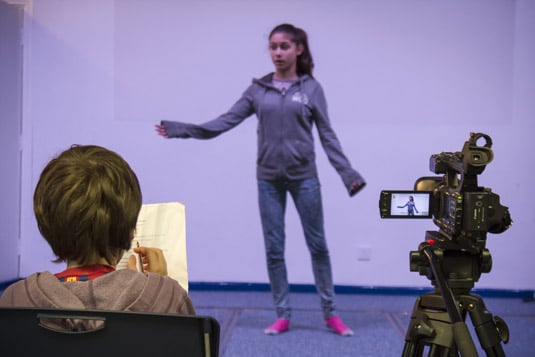Let’s say you have a queue of people fighting over the main part in your digital film, and you’re wondering whom you should choose. Well, running auditions is the answer. Auditions are a great way to give your potential cast the opportunity to show how good they are and why they deserve a part in your film.

You may want to ask someone else to run the auditions with you. This allows you to discuss each audition with another person and gives you someone to help you make your decision. It can also useful to film the audition: You can watch it again later and remind yourself how well each audition went.
Auditions can be quite stressful, so they’re also a good way to see how an actor works under pressure. This can give you an idea of how the actor will behave in front of a camera. After all, even the most confident people can go shy when a camera is pointed at them.
The following list describes some things to look for in the actors you meet when running auditions:
How do they deal with stress? It’s not unusual for actors to get nervous. It’s how they deal with that problem on‐camera that’s important. Can they hide their nerves? Do the nerves affect their performance? Do they look like a stunned rabbit in headlights? Give them time to relax by telling them about what will happen in the audition and a bit about the production, if you want. Here you can see how they listen and if they are interested in what you are telling them.
Are they natural? When an actor is performing, does it look and feel real? You should be able to believe what the actor is saying and almost forget that she is playing a role. Does she sound like she is just reading lines? If so, ask her to think more closely about the lines she is performing and to try to imagine herself as the character.
What’s the actor’s voice like? An actor’s voice should suit the character and the lines he or she will be saying in the film. When performing, does the actor sound like a robot or does he deliver the lines with feeling and emotion? An actor’s voice is as important as his facial expressions and his body. It should convey emotion, and it should sound interesting, not boring. Also, listen to how clear his voice is: Does he mumble or rush words?
How does the actor respond to direction? The actors you choose should listen to you and do what you ask them to do. The last thing you want is an actor who thinks she knows better than you and does whatever she likes. During the audition, ask your actors to change something about the way they deliver their performance.
See whether they do what you ask (or whether they at least try). You could ask them to pause before saying a line or change the amount of emotion in a line.
How does the actor work with other actors? It’s important that your actors be able to work well both on their own and with other actors. The only way to test this in an audition is to have the actor act a scene with another actor in the audition. Look to see whether the actor responds to what other actor is doing in the scene. Does he overpower the other actor or does he support her?
Has the actor learned the lines? If you asked the actor to learn a scene or part of the script for the audition, she should have taken the time to learn it. This shows whether she is committed to your film and is a reflection of how much she wants the part. You could allow her to have the script on hand to refer to, if necessary, but sometimes a script can be more of a distraction than a support — if it’s there, she’ll look at it.
What does the actor know about the character? When actors come in to an audition having done research on the film project and the character they are auditioning for, it shows enthusiasm and a real desire to get the role. As part of your audition process, ask the actor questions about the character and what he knows about the film.
He won’t be a mind reader, so unless you provided information about the project with the audition information, then he won’t be able to answer much. You could ask him about the character, however, because he could get some information from the script.
When organizing your audition, make sure as many people as possible know about it so plenty of people turn up. Put an ad in the local newspaper or post one to Craigslist. Create a poster to put up at your school or send text messages to your friends or any other people you think might be interested. Be sure you include the date, time, and location of the audition, along with details about the film and any relevant information about the characters you’re auditioning for.
Ask the actors to prepare a monologue to perform at the audition. This could be a short play or sketch they can perform on their own. Alternatively, send them a script to learn. The script should be only a few minutes long: You want to see how well the actor performs a character, not how well he or she learns a script.
When looking for actors for your film, sometimes it’s worth asking any drama students in your school or drama students from local colleges if they’d like to be involved. For serious students, any work they get is valuable experience — and another film they can add to their portfolio.

